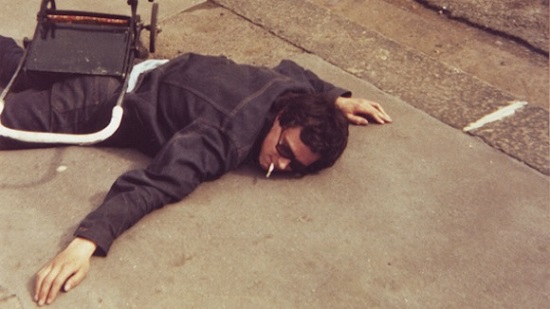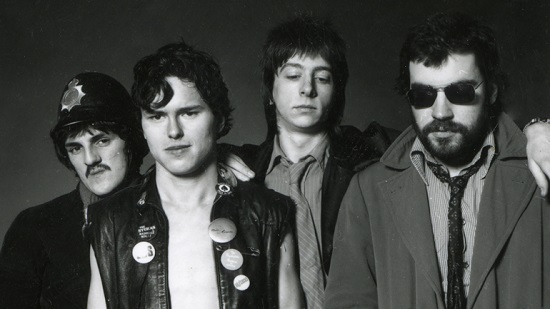When did it become the norm to be confronted by the ghoulish sneer of a wrinkly old punk every time we turn on the television? Whether they’re selling butter, car insurance, or stumbling their way through another tired anecdote on BBC4, the general stock in punk histories, demand for talking heads, ephemera etc. shows no sign of slowing. Of course, the big market for punk-related output is no automatic indicator of quality, indeed these films, tours and coffee table books don’t always do the original sounds, sights or scene much justice. Against this backdrop of aggressive retro-fetishism, certain bands will always get written out or sidelined – perhaps they’re too niche, not sexy enough, or they contradict other easier, more established narratives. Unsurprisingly, it’s here that the most interesting stories often lie, the ones that are worth exploring further – a hunch that filmmaker Fred Burns must no doubt have had when he set to make a documentary about a Croydon punk group.
Enter Johnny Moped. Formed in 1974 as the vehicle for school boy hijinx in that special space where lack of musicality becomes a badge of pride, the band had a carousel of members that careered through the rest of the 70s. They played free festivals and pissed off snarky King-Crimson-playing terminal sixth-formers. Then they landed, haphazardly, freshly shorn, at ground zero: the Roxy, where much of the dazzling Don Letts live footage that we see in the film was shot. It’s all light trails and colanders affixed to heads, babyfaced major players pogoing in the back. Total new oblivion.
Billed for promotional purposes as the ‘lost band’ of first wave punk, strictly speaking the Mopeds are already more than cursorily known, at least to a certain cabal of enthusiasts, but it is their lives, their performances and their genuinely entertaining band story that the documentary sets out to explore. It’s a generous and honest document of realising success on your own terms, still peppered with frustrating memories of how the real lives (not to mention overbearing mother-in-laws) of even the wildest punks can get in the way.
The Mopeds never did ‘make it big’ by the standards of the day, but those were pretty high during the brief era when major labels flocked to punk bands looking for cheap invective as much as sonic invention. They were still often named (albeit by a slurring Shane MacGowan) in the same breath as "The Pistols, The Clash, The Damned, The Mopeds", and released a blistering 7” on Chiswick in the form of ‘No One’/’Incendiary Device’, which includes the classic line "stick it in her lughole, stick it in her other parts." Johnny Moped plied an oddball trade in staccato pub-rock power chordisms shot through with solos; sped up twelve bar blues nicely addled by an excessive amount of pints. All this was catapulted into the realms of the bizarre, the ridiculous and the totally sublime by frontman Johnny himself, a splenetic sometimes screeching, sometimes growling avant savant who, as Billy Childish puts it in the film "looked like he’d been dressed by his Mum." Johnny describes himself as "82% disabled", beguiling the audience with his unpredictable presence, a loose cannon disguising a classic rock and roll vocal with remarkable range.

Filmmaker Fred Burns happens to be the son of former Moped Captain Sensible of The Damned and Rachel Bor of Dolly Mixture, and this personal connection is perhaps key to the notably thoughtful, sensitive reflections extracted from men who named themselves things like Xerxes and Slimey Toad. The Johnny Moped story speaks to those irregular roots of first wave punk that took hold in well-kempt back gardens (where the Mopeds played their first gig) and not on telly, and represents a far more intriguing flashpoint than the overexposed peacocking of the King’s Road. In this sense, despite their status as Roxy regulars and one-time NME darlings, Johnny Moped might have had more spiritually in common with the iterations of what John Peel called the "atom-splitting moment" of UKDIY, as documented by the Messthetics compilations, that bedroom-fuelled everyone-can-make-a-band universe, where punk, borne of suburban boredom over big city ambition, could sound like anything if fuelled by the burning impulse to make do and create anew.
From Hells Angels death threats over an ill-advised tattoo to tours where the venue each night was the back of the van itself, what Johnny Moped may be short of in mass recognition they make up for in anecdotes and their loveably hectic Croydonian Dada style; as if Duchamp was wanted for smashing up the local boozer at closing time. This runs through both their performance and their accidentally amazing promo videos which were unearthed for the film. These were directed by Barney Bubbles, a gifted graphic artist whose work and influence deserve much wider attention. Yes, the subsequent fame of certain former members (particularly original guitarist Chrissy Hynde) are a world away from the "rock and roll dole" endured by the rest, but as a result the current line-up, older as they might be, shows no sense of lost glory, revisionism or nostalgia tripping. It’s this sense of having a laugh and being in a band with your mates as the ultimate end goal over and above everything else, which really punctuates the highs and lows of their story.
A full-throttle official vinyl reissue of their 1978 full-length Cycledelic is long overdue. Here’s hoping this brilliant film gets the wheels moving.
The premiere of Basically, Johnny Moped is happening at Koko on Thursday 19th September, featuring live performances from the band and Captain Sensible. Tickets and info here: http://basicallyjohnnymoped.com


